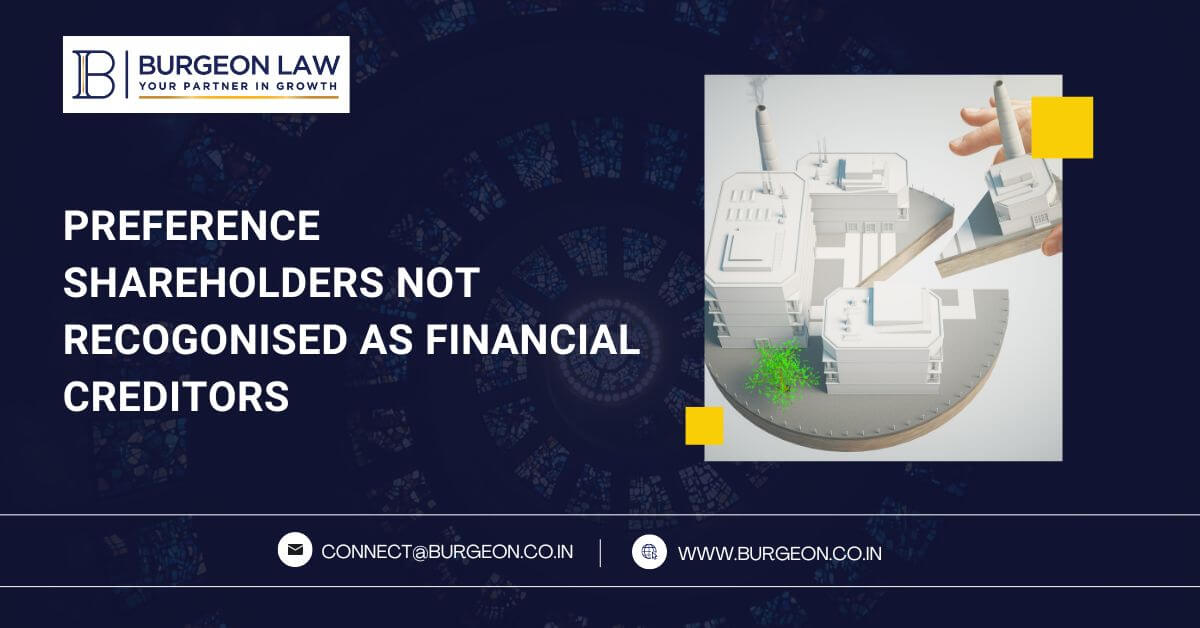Table of Contents
ToggleNCLT Bench rules Preference Shareholders not recognized as Financial Creditors
On August 29, 2023, the Kolkata bench of the National Company Law Tribunal (NCLT) has issued a ruling in the case of EPC Constructions India Limited vs. M/S Matix Fertilizer and Chemicals Limited, stating that preference shareholders who hold Non-Cumulatively Redeemable Preference Shares (NCRPS) cannot be classified as financial creditors of a company. Consequently, they are not eligible to initiate the Corporate Insolvency Resolution Process (CIRP) under section 7 of the Insolvency and Bankruptcy Code, 2016 (IB Code).
The NCLT’s decision was based on the principle that only creditors with outstanding debts against the company have the right to initiate insolvency proceedings. Preference shareholders, despite having the right to receive dividends from the company, do not obtain the status of financial creditors when their shares are not subject to redemption. The non-redemption of preference shares does not transform preference shareholders into creditors, nor does it convert the carrying value of preference shares and dividends into a debt.
Case Background
- The case stemmed from a petition filed by EPC Constructions India Limited, represented by its liquidator, Mr. Abhijit Guhathakurtha hereinafter referred to as Financial Creditor/the Petitioner. M/S Matix Fertilizer and Chemicals Limited was the Corporate Debtor/Respondent in the case and was alleged to have defaulted on a payment of Rs. 310,00,00,000 (Indian Rupees Three Hundred and Ten Crores) owed to the Petitioner.
- The Petitioner was allotted 25 Crore CRPS shares in respect of receivables to the tune of Rs. 250 crores out of the amount of Rs. 572.72 crores (approx.) arising out of mutually accepted terms under a contract executed between the parties.
- In response, the Petitioner filed for CIRP under Section 7 of the IB Code on account of default in redemption and pay-out of Rs. 310,00,00,000 (Indian Rupees Three Hundred and Ten Crores) having become due and payable on account of maturity of 25 Crore CRPS.
- The Petitioner held Rs. 25 Crore in preference shares in the Respondent and Company and claimed that the defaulted amount qualified as a “debt” under Section 3(11) of the IB Code.
- The issue arose when the Petitioner filed for insolvency resolution due to the default in the redemption of Cumulatively Redeemable Preference Shares (CRPS).
Key Issues
The key issues addressed in the case were as follows:
- Whether preference shareholders should be considered financial creditors of the Company.
- Whether an application filed by a preference shareholder under Section 7 of the IB Code is maintainable.
- Whether CRPS should be categorized as an investment or a financial debt with the commercial attributes of borrowing.
Findings
The Tribunal determined that no liability could be deemed to exist in the absence of payment for CRPS. It clarified that a default could not be considered unless CRPS was payable. Section 55 of the Companies Act, 2013, governs the issue and redemption of preference shares, specifying that preference shares can only be redeemed from the company profits available for dividends or from the proceeds of a new share issuance specifically intended for such redemption.
Therefore, Section 55 explicitly states that if the issuing company lacks profits available for dividends or has not secured new equity investments for the redemption of preference shares, the redemption of preference shares cannot occur as outlined above. Consequently, preference shareholders cannot be recognized as financial creditors of the company unless their preference shares become redeemable.
While preference shares grant their holders priority in receiving dividends when the company announces them, it is crucial to note that the payment of dividends to preference shareholders is contingent on the company’s profitability.
Therefore, it is not mandatory for a company to pay dividends, as dividends typically come from the company profits shared with shareholders. Hence, CRPS is essentially an investment and not a debt until it becomes eligible for redemption.
In this particular case, the Petitioner argued that the amount of Rs. 310 crores owed by the Respondent should be considered “debt” under Section 3(11) of the IB Code. This section defines “Debt”; as a liability that is a claim that is due, including financial and operational debts. Thus, if payment for CRPS is not due, no liability can be said to exist. Furthermore, Section 3(12) of the IB Code defines "default" as the failure to repay a due debt, in whole or in part, by the debtor or corporate debtor. In conclusion, non-payment of CRPS cannot be considered a default unless CRPS is actually payable.
Conclusion
Considering the factual and legal circumstances, it is evident that the Petitioners claim of “Debt”; is not valid, and a “Debt”; cannot be established as per the IB Code. Consequently, the petition filed under Section 7 of the IB Code lacks merit and is deemed not maintainable by the Tribunal. This ruling by the Tribunal reinforces the principle that preference shareholders are not considered financial creditors of a company unless their preference shares become due for redemption.

